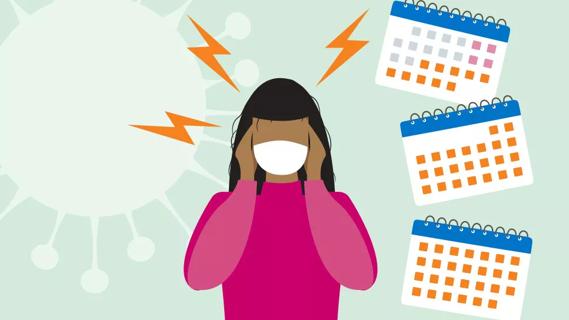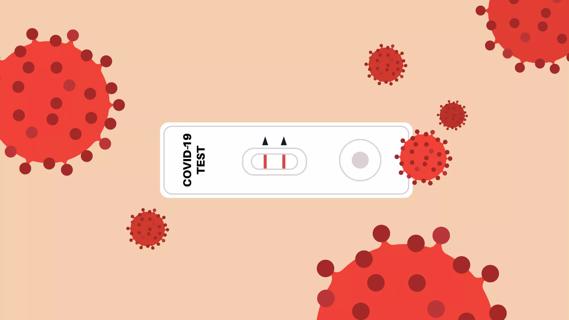If you've been feeling a little more drained while sheltering in place, here's your answer

During week one, you might have thought, “Hey, this isn’t so bad. I get to work in my jammies and hang out with the fam.”
Advertisement
Cleveland Clinic is a non-profit academic medical center. Advertising on our site helps support our mission. We do not endorse non-Cleveland Clinic products or services. Policy
Now, it feels like week 1,000 and you can’t wait to get back to the office and your neighborhood establishments.
For a great deal of us, #quarantinelife has been an interesting, challenging and sometimes stressful experience. While it’s nice that people have tried to spin this period as a blessing in disguise or a time of reflection and improvement, we know it’s not that simple once you fold in work, family and personal obligations. Some of us aren’t blissed out right now. We’re exhausted, cranky, worried and we’ve been consumed by a great deal of uncertainty.
If you’ve felt any of these, you’re most likely feeling the effects of quarantine fatigue:
“That’s part of the stress from all of this,” says behavioral health therapist and mind-body coach Jane Pernotto Ehrman, MEd. “It’s just overwhelming and part of the fatigue is the uncertainty, unpredictability and the unknowns in all of this.” To put things in perspective, Ehrman makes this comparison.
“It’s like we’re in the middle of the ocean. The ocean is COVID-19 and we’re not seeing land anywhere. It’s that feeling of helplessness. Like there’s nothing you can do — or you can do everything right and still get sick.”
Advertisement
Have you been monitoring the news from the start? It’s understandable why you’re feeling run down and stressed out, Ehrman explains.
“Every time we turn around, they’re telling us, ‘Here are some other symptoms.‘ We’re just looking at the symptoms and it’s an overwhelming kind of underlying, ambient stress that’s just always there. It’s like an 18-wheeler diesel truck that’s always in idle. It’s always going on — it’s always underneath us.”
The coronavirus has obviously been the 800-pound gorilla in our lives for the past few months. It has drastically altered milestone celebrations and recreational activities on top of eliminating a lot of the services that we rely on daily. These major changes have brought on a lot of grief. In grieving the lives we once knew, we find ourselves feeling drained or emotionally numb.
“This kind of fatigue drains our motivation. We just want to go lie down on the couch and do nothing. Because of these difficult situations, we’re in a kind of shock and we don’t know what to do,” says Ehrman.
She emphasizes that the best thing that we can do is recharge and focus on our health. “If we don’t take action and recharge, we will remain stuck. So, it’s important to relieve stress to re-energize and be more present.” Ehrman adds that if we don’t take time out for ourselves, we risk crashing and burning. We can also run down our immune system.
Ehrman recommends practicing self-care if you haven’t been. Yoga, meditation, reading, taking baths, getting out into nature or even watching funny movies are great ways to relax your mind. She also suggests checking in regularly with neighbors, friends and family for some extra peace of mind.
If you’ve been dealing with some really heavy stuff during this time, it might seem like your situation will never get better. But Ehrman says there’s a way forward and it starts with our mindset.
“It’s important that when you’re in very difficult circumstances, you first acknowledge them and allow yourself to experience the grief and loss about everything. Then, take some breaths and remember that nothing lasts forever. Think about your gifts, skills and some ways to move forward. It’s okay to be stressed or anxious about something or to worry. But you eventually have to look at solutions.”
Contrary to popular belief, it’s not possible to be #teamgoodvibesonly 24/7, and that’s OK. If you’re grappling with worry that’s rooted in anxiety and you find yourself spiraling out, Ehrman offers this advice.
“The important thing is to breathe. As soon as you realize that you’re starting to get anxious and ramped up, breathe and pay attention as you inhale and exhale. It gets you out of your head and into your body. It helps you to become present. Then you can say, ‘Wait a minute, why am I thinking these things?’ We don’t have control over the thoughts that come into our minds. Where we have control is deciding which thoughts to entertain and which thoughts to say, ‘Nope, that’s not helpful — I’m not going there.’ “
Advertisement
Breathing is very critical during these panicked moments. Why? Because when we’re anxious, we tend to shallow breathe or hold our breath. “When we do that, we’re not getting enough oxygen to the brain. Your brain needs about 20% more oxygen than the rest of your body. So when you don’t get enough oxygen to the brain and it hits that tipping point where it’s not enough, the brain will trigger anxiety to get your breathing again,” says Ehrman. That’s why it’s so important to slow down and take time to breathe so you can get centered again.
Ehrman gives a few helpful ways for how you can address worrying right now.
Advertisement
The phrase “once things get back to normal” has been thrown around a lot these days. It would be nice if we could wish away everything that’s happened over the last few months. However, Ehrman sees this as a time to really evaluate if we were truly satisfied with our lives before the pandemic hit.
“People want to go back to what they “remember” as normal – how good things used to be,” she says. “To me, tough situations are really powerful opportunities for us to look at how we want to live differently and better.“
Ehrman compares the “back to normal” sentiment to trying to go back to what can never be. While change is often scary, she doesn’t believe in living in the past.
“Normal is going back to the illusion of life rather than living with the truth. When we say, ‘I want to go back to the way it was,’ we can’t. You can’t go back to high school. You can’t go back to last summer. You can’t go back to yesterday,” she says. “All you can do is take the wisdom and insight from what happened and move forward. Think about how you want to live today and how you want to take that into tomorrow.”
Advertisement
Learn more about our editorial process.
Advertisement

The short answer: It’s complicated, but the basic care precautions still prevail, like washing your hands and isolating if you’re sick

They can feel like a typical headache or a migraine headache, but the pain can last for weeks to months

Any large social gathering — from a family birthday party to an indoor music concert — has the potential to spread serious infection

It’s important to connect with a healthcare provider, get quality sleep and balance your activities with your energy levels

Just like the flu, COVID-19 will continue to evolve every year

The duration varies, but symptoms can linger for a few days up to a couple weeks or more

Vaccination is best for prevention, but if you get sick with COVID-19, treatments are available

The virus lives best in humans, but it can last on hard surfaces, like doorknobs and railings

Type 2 diabetes isn’t inevitable with these dietary changes

Applying a hot or cold compress can help with pain